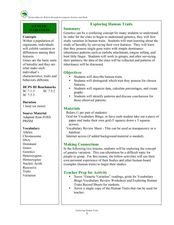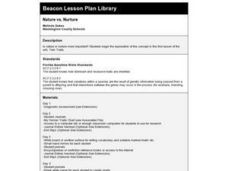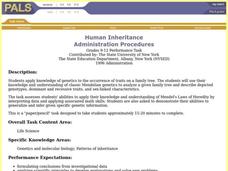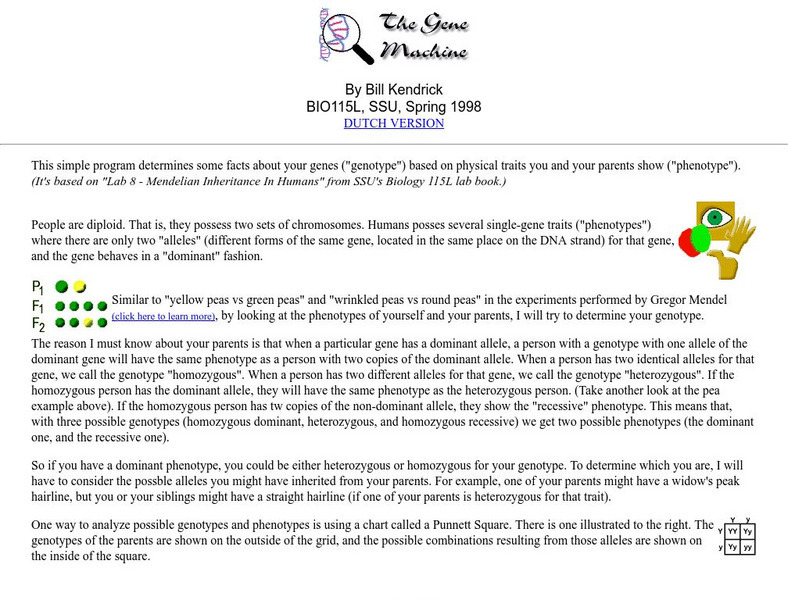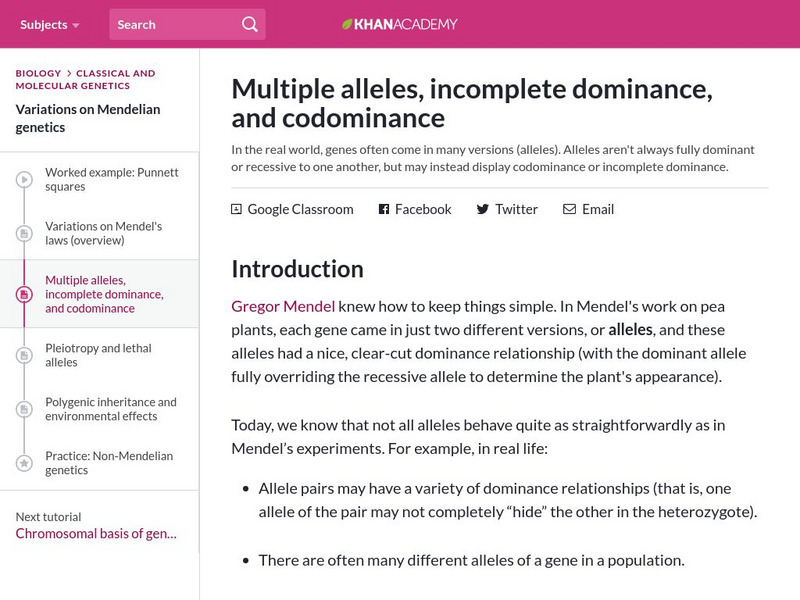Curated OER
Exploring Human Traits
Young scholars explore human behavior by participating in a class science game. For this human characteristics lesson, students identify different human traits that are passed down by each generation and the purpose each of them have....
Curated OER
Making Babies
Students participate in a genetics activity in which they determine genotypes and phenotypes for given traits. They work with a partner and create babies based on their genotypes. Once traits for babies are determined, they write...
Curated OER
Making Babies
Sixth graders complete a human traits survey. In this genetics lesson students read articles and fill out a worksheet on genotype and phenotypes.
Curated OER
EMS Lesson 2: Outrageous Offspring
Young scholars investigate the principles of probability that can be used to predict hereditary traits.
Curated OER
Nature vs. Nurture
Eighth graders investigate the concept of nature versus nurture in human development through this series of lessons.
Curated OER
Inheritance Word Search Puzzle
In this literacy activity, students find the words that are related to the concept that is the theme of the word search puzzle.
Curated OER
The Genetic Basis of Neurological Disorders
Students describe some aspects of known genetic defects on the human neurological condition. They participate in a variety of exercises including drawings, games, and analogies.
Curated OER
Human Inheritance
Learners analyze genetic characteristics in a given family tree through the F2 generation. Students apply prior knowledge from Gregor Mendel's study with pea plants and his Laws of Heredity to answer questions.
Curated OER
Karyotypes & Chromosome Inheritance
Pupils study Mendelian genetic terms, locate and name loci on chromosomes, karyotype construction, inheritance patterns through families.
Curated OER
Online Research for a Genetic Disorder
In this genetics worksheet, students access a given website, chose a genetic disorder, and complete the 10 short answer questions about the disorder.
Vision Learning
Visionlearning: Genetics: Gene Expression
Explore the connection of genes and enzymes in regards to heredity and genetics. Concepts associated with dominant and recessive traits are also presented.
University of Hamburg
University of Hamburg: Deviations From Mendelian Laws And: What Is the Meaning of Dominance?
Upper level discussion of several of Mendel's experiments and laws.
PBS
Pbs Learning Media: Some Genes Are Dominant
This interactive activity, adapted from the Dolan DNA Learning Center, illustrates how Gregor Mendel used purebred yellow and green peas to show that some genes are dominant and others are recessive.
Other
Biology Project: The Gene Machine
Site allows users to learn interesting information about their genes based on his/her physical traits. Provides a brief explanation of how a person's genotype is determined.
Center for Innovation in Engineering and Science Education, Stevens Institute of Technology
Ciese: Human Genetics Project: Is the Dominant Trait Most Prevalent?
Human-Genetics: A Worldwide Search for the Dominant Trait allows you to collect data and share your results with students around the world. Register your class, complete the student survey, participate in discussion boards, and interact...
BiologyWise
Biology Wise: Dominant and Recessive Traits in Humans
Explains what dominant and recessive traits are and how they work, and provides a list of single gene traits with the degree of manifestation if they are dominant or recessive. Also discusses co-dominance, incomplete dominance, polygenic...
Oklahoma State University
Oklahoma State University: Ag in the Classroom: Hairy Heredity [Pdf]
A simulation where students flip coins to mimic how parents pass genetic traits to their offspring through heredity. This activity also illustrates the difference between dominant and recessive genes, and how they interact with each...
Khan Academy
Khan Academy: Multiple Alleles, Incomplete Dominance, and Codominance
In the real world, genes often come in many versions (alleles). Alleles aren't always fully dominant or recessive to one another, but may instead display codominance or incomplete dominance.
ArtsNow
Arts Now Learning: The Gene Connection Show [Pdf]
Fifth graders will discover the difference between inherited traits and learned behaviors by bringing the traits to life in a game of charades. After that, the students will demonstrate knowledge of recessive and dominant traits as they...
National Cancer Institute at the National Institutes of Health
National Cancer Institute: What Are Gene Mutations?
This website provides an answer to the following question: "What are Gene Mutations?" Many links are provided throughout this short description that access information on related subjects.
TeachEngineering
Teach Engineering: What's Dominant?
In a class discussion format, the teacher presents background information about basic human genetics. The number of chromosomes in both body cells and egg and sperm cells is covered, as well as the concept of dominant and recessive...
The Association of the British Pharmaceutical Industry
Abpi: Genes and Inheritance
A complete, student-paced lesson on genetics and inheritance. Students work their way through illustrations and animated tutorials, and answer review questions along the way. There is a self-checking quiz at the end of the lesson.
PBS
Pbs: Our Genes/our Choices: The Probabilities of Problems: A Look at Inheritance
Learn how the genes inherited from two parents can be recombined in their offspring in this simulation activity. In addition, investigate the probabilities of passing on inherited genetic disorders.
Ducksters
Ducksters: Biology for Kids: Hereditary Patterns
A site with information about the hereditary patterns in the science of biology including dominant and recessive genes, alleles, the Punnet square, examples, and interesting facts.


